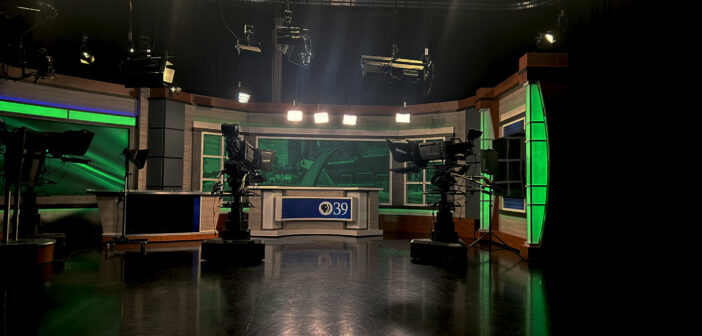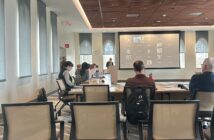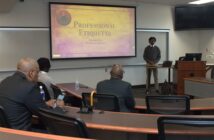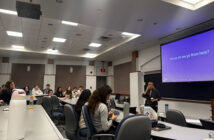Lehigh created its radio station, WLVR, in 1973. In 2000, AJ Fritzinger, the host of the acclaimed radio show “Fritz Rocks,” became the manager and chief operator of the station.
Since then, the radio has created two signals – WLVR-FM and WLVR-HD-2. WLVR-FM is currently operated by Lehigh Valley Public Media, while WLVR-HD is still run by the university.
Fritzinger unexpectedly died in December 2024. Since then, the future of the radio station has been uncertain.
Chris Senft, ‘89, is temporarily taking over the role of chief operator for WLVR-HD-2 for Lehigh.
Senft was a former disc jockey at WLVR-HD-2 as an undergraduate from 1985 to 1989 and hosted the show “Radiation Sickness” from 1987 to 1990. He returned to Lehigh in 2017 to assist Fritzinger with WLVR-HD-2’s marketing.
During the COVID pandemic, the radio station began to struggle, as university staff didn’t want radio employees to come on and off campus due to safety precautions, Senft said.
The station then moved into Fritzinger’s house in Bethlehem and was run from there. Senft said the station lost a lot of its student staff due to Lehigh’s remote teaching structure.
He also said one of his goals is to bring the station fully back to campus.
The radio station is currently located in Lehigh’s Grace Hall, where Senft said he can tap into the radio remotely. However, he said he would like to change the location due to a mold issue in the building that has yet to be resolved.
Senft said there are no concrete plans for the radio station’s future location, but he is currently pushing to get a new studio in the Clayton University Center to promote student traffic and engagement.
“That (move) would be phenomenal for WLVR,” Senft said. “But I think it’d be phenomenal for the students and the whole university at large because it would be a way for them to see this other powerful organization that is here for them.”
While location plans remain uncertain, Senft said the radio station will soon offer new opportunities for students beyond broadcasting music.
Senft said he’s planning to offer students to work with music shows, talk shows, live broadcast events, station engineering, station marketing and branding, and station management. He said these opportunities will help students build their resumes for post-graduation jobs.
While Senft said he hopes these changes to the station will increase involvement, Lehigh radio currently has much less student participation than other stations at surrounding schools.
Scott Legath, Lehigh’s contract radio engineer who also works with other colleges in the Lehigh Valley, said WLVR has lower student engagement than the station at Lafayette College.
“(Lafayette’s) station was somewhat dormant for a few years,” Legath said. “But current students have a strong interest in bringing back the radio station.”
Legath said he agreed to work for Lafayette when he saw the high amount of student interest and has been helping revitalize their station. While he said the station is still in the final stages of being put back together, it is on the air at this point.
Tess Stanley is an undergraduate at Lafayette and the general manager of the school’s radio station, WJRH. She said she took over as a manager about two and a half years ago when the station was in decline.
Today, she said, the station has eight board members and 20 students involved.
Stanley said being involved with the radio station at Lafayette is the best decision she has made in college.
“I think that having a radio station can be very important in an individual’s experience in college,” Stanley said. “I really have loved being able to work at a radio station, just because I think it’s a uniquely independent and individual opportunity on campus.”
In 2019, Lehigh announced a partnership with Lehigh Valley Public Media to operate its radio station through a lease management agreement.
Under this agreement, Lehigh Valley Public Media manages and operates the FM digital signal while the university keeps ownership of the Federal Communication Commission license.
According to the announcement, part of this agreement was that Lehigh Valley Public Media would provide students with opportunities like paid internships and scholarships.
Legath said Lehigh Valley Public Media has not upheld its end of the agreement, which has contributed to Lehigh having less student involvement than other schools, like Lafayette.
“I’ve heard through my involvement with (WLVR-HD-2) that (Lehigh Valley Public Media) did not hold a lot of their terms of the deal,” Legath said.
Senft said Lehigh Valley Public Media was supposed to offer student internships, do publicity for WLVR-HD-2 and give money to the station. Like Legath, he said he’s unaware of any support from the organization though.
“I have no evidence that any students were given the opportunity to broadcast as an intern or get involved with their radio programming as an intern,” Senft said.
Laks Srinivasan is currently serving as the interim CEO of Lehigh Valley Public Media.
Srinivasan said Lehigh Valley Public Media has prioritized integrating its media platforms, and there have been some lost opportunities for Lehigh students.
“I think it is just things falling through the cracks,” Srinivasan said.
In a follow-up email interview with The Brown and White, Srinivasan said things fell through the cracks due to hurdles and disruptions caused by COVID, and that is not representative of the bigger picture of the partnership.
He wrote that since the partnership was formed, there have been 16 students who have benefitted from internships in fields such as news, marketing and educational programming.
“We look forward to exploring more ways for students to gain experience in journalism, from news gathering and reporting to content production and distribution,” Srinivasan wrote.
Srinivasan said there have been meetings about the future of the License Management Agreement between Lehigh and Lehigh Valley Public Media.
He said he could not disclose the information from these meetings.
In his following email, Srinivasan wrote that Lehigh Valley Public Media is constantly having conversations about how to strengthen the future of their partnership with the university.
Ashley Lemmons, Lehigh’s associate dean of students, wrote in an email to The Brown and White that the station is “looking to partner more closely with PBS for students to be able to access their station for experiential learning.”
She also wrote that she had no more information to disclose at this time beyond what Senft and Legath had shared.
Legath said Fritzinger was a large advocate of holding Lehigh Valley Public Media accountable prior to his death.
Jack McGhee, ‘26, the student president of WLVR, said he worked with Fritzinger throughout the past two years to uphold both ends of the agreement.
He said despite its efforts, Lehigh Valley Public Media and Lehigh have been very slow to come to a solution determining what is expected from each party.
“I totally feel like Lehigh has sort of robbed me of a classic college experience,” McGhee said. “It’s more due to Lehigh Valley Public Media and then Lehigh’s negligence, but Lehigh Valley Public Media — they knew what they were doing.”
Senft said a few years after the License Management Agreement was formed, Lehigh’s Student Senate voted for the radio station to not be a funded organization.
“After someone in Lehigh’s (Student) Senate came to understand that we had this agreement, they cut us off from (funding) with the thought that we were getting so much more money elsewhere, which we weren’t,” Senft said.
Morgan Galvao, ‘25, vice president of finance in the Student Senate, confirmed that WLVR-HD-2 is not a funded organization because the senate thought the radio station was sold.
“(WLVR-HD-2) used to be a sponsored organization a couple of years ago,” Galvao said. “This was before I was on senate, and then the (WLVR executive board) sold the radio station to some other company, so then they were disbanded as a sponsored organization.”
Galvao said she’s unaware of what company Lehigh Student Senate thought the radio station was sold to.
Senft said in order for WLVR-HD-2 to obtain updated technology, the organization needs to be funded by Lehigh. He is currently trying to get WLVR-HD-2 reinstated with the Student Senate.
Despite the challenges at WLVR-HD-2, Senft remains committed to honoring Fritzinger’s legacy. He said he hopes to stay involved with students and continue sharing the importance of radio just as Fritzinger did.
To preserve Fritzinger’s mark on the station, Senft said Fritzinger’s pre-recorded content, including station IDs and archived radio shows, will continue to air in the future.
“We’ll probably continue to use those forever,” Senft said. “So, his voice will continue to be heard throughout the station.”






Comment policy
Comments posted to The Brown and White website are reviewed by a moderator before being approved. Incendiary speech or harassing language, including comments targeted at individuals, may be deemed unacceptable and not published. Spam and other soliciting will also be declined.
The Brown and White also reserves the right to not publish entirely anonymous comments.
8 Comments
I fully support Lehigh University resuming operation of WLVR-FM in the best interests of the University and its student body.
A serendipitous invitation to sit in on the radio show of one of my Sigma Alpha Mu fraternity brothers opened up a whole new world for me. I ultimately hosted a classic rock radio show and also an interview show (with visiting campus celebrity guests, ranging from Watergate criminal, John Ehrlichman to film star Vincent Price). My experiences on WLVR-FM were critical components to my formative, Lehigh experience. Hosting, producing, and marketing these shows provided real-world experience in public speaking, public relations, marketing, research, technology operations, and event production. Plus, it opened up a whole new group of Lehigh undergraduates as friends, some of whom became lifelong friends.
WLVR’s FCC license is a hidden gem that Lehigh undervalues.
Lehigh needs a collective effort of students, faculty, alumni, and administrators to return WLVR operations to the students and recover from the pandemic “unawareness” of the benefits of what radio broadcasting and webcasting can offer its undergraduates, the University, and the community, both near and far.
David, thank you for your comments. YOU GET IT!
Like David Polakof, I fully support Lehigh University resuming operation of WLVR, and the Student Senate funding the station. College radio offers many opportunities for student growth, and at the very minimum, an ice breaker fun fact when you’re older.
I was a DJ from Fall 1987 through the summer of 1989, and it’s a cherished part of my Lehigh experience. Making it even more special, I learned after my first semester, my father (George Dolan ’61) had been a station engineer for WLRN, the precurser to ‘LVR, building their sound board, and pulling cable through the tunnels below The University Center at Packer Hall.
Lehigh must not let this gem or a license and experience go to waste.
I was saddened to hear NPR taking over the WLVR airwaves when I was at Reunion last year. I assumed it was because students these days stream all their music. But being a Radio DJ at Lehigh was one of my favorite activities. I got to work on the specialty hour, inheriting the Reggae slot from a friend. We worked with a local DJ in town. In fact, DJ Miguel, well known in the Allentown area, was the DJ for my wedding!
I also did a Jazz show for a spell and even did an overnight show playing album sides. Lehigh should invest in college radio. College radio was responsible to bringing alternative music to the mainstream and provides amazing learning experiences for all students!
Sincerely,
Maribel Cabrera
BSIE 1990
If any current or future students are interested in participating on the Lehigh University Student Radio Station WLVR, please send an email to publicaffairs@wlvr.org
WLVR belongs to the students, never should have been given to NPR. The university should embrace the operation. Hope WLVR becomes a full service station, with talk, news, sports and music.
As one of the station engineering team that installed the transmitter in 1973, I’ve been disheartened to see what has become of WLVR. At the time a student managed operation, it not only provided opportunities for broadcasting entertainment and news to Lehigh and the surrounding Bethlehem community, but also for developing leadership and business skills. It would be a shame to see it fade away
Thanks, Bill!
I also whole-heartedly support bringing the station back on campus, preferable to its prior home in the University Center! Radio station alumni have gone on to major, successful roles in business, industry, and healthcare. The experience of running a station, producing content, and serving on the board (WLVR and WLRN) provided a unique and extremely valuable learning experience!
I hope Provost Nathan Urban will listen and support this effort!
Chad Paul ’76 WLRN DJ, Newscaster, Network Sales Manager, and Network General Manager